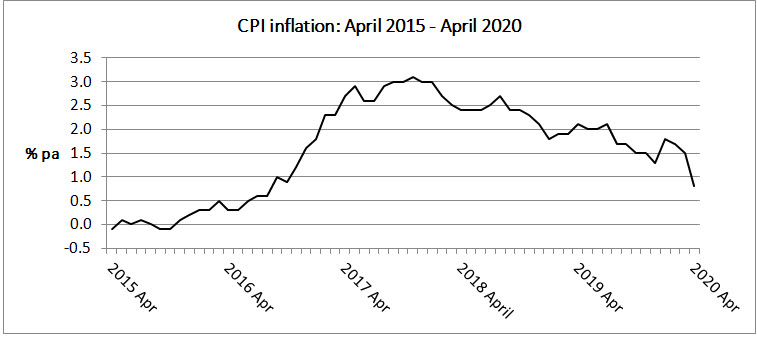The disappearance of normal spending habits has created problems for the statisticians who calculate the rate of inflation.
Source: Office for National Statistics
Inflation, as measured by the Consumer Prices Index (CPI), fell sharply in April to just 0.9% against 1.5% in the previous month. The main reason for the drop was energy costs:
- Ofgem’s new price caps for gas and electricity standard variable rate took effect in April and these were about 10% lower than the rates from April 2019. Even so, the bills set by the caps are generally much higher than those that can be found on any comparison website.
- Petrol and diesel prices were also much reduced year on year – by 15.1p a litre for petrol and 17.0p a litre for diesel.
Missing items
In addition to the sharp moves in energy costs, there was also a serious problem with gathering the data. The Office for National Statistics (ONS) has an annually reviewed ‘shopping basket’ of goods and services which it uses to calculate the various inflation indices. However, for the latest numbers, the ONS discovered about 90 of the items in its basket – about one sixth of the total value – “were unavailable to consumers in the UK”. Haircuts, cinema tickets and a pint in a pub are just some of the many examples. Other items were theoretically available but in short supply, making the ONS’s price-tracking task more difficult – self-raising flour being a typical problem item. Ultimately the ONS was forced to “impute” (i.e. estimate) some prices.
Although some of the goods are still available, the restrictions on our movements mean they are no longer being bought. The ONS basket contains items which can be bought but are just being ignored in lockdown – many travel services fall into this category. For now, at least, the basket is not representative of historical spending patterns. We may find that creates problems in the long term, as inflation indices are widely used by government to adjust benefits, prices and tax allowances.
Inflation may be under 1% and somewhat distorted at present, but it has not gone away. Some economists fear that it could roar back because of all the borrowed money being pumped into the economy by the government. Others think a recession/depression will keep inflation in check. Either way, it still needs to be factored into your plans: £1 in April 2015 has only 92p of buying power today.







